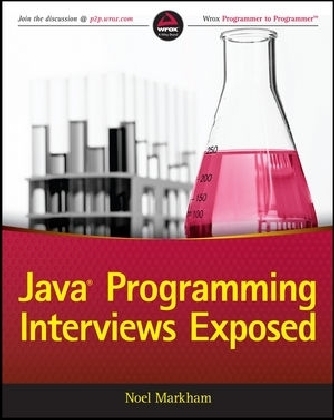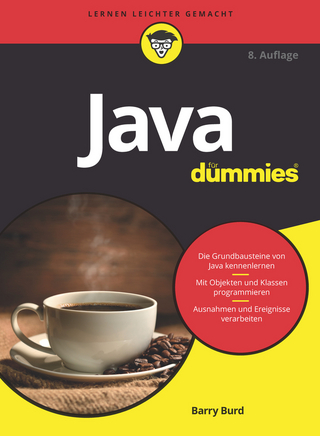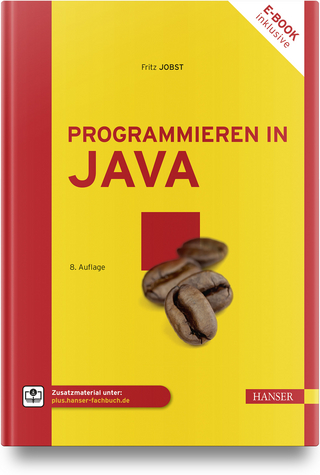
Java Programming Interviews Exposed
Wrox (Verlag)
978-1-118-72286-2 (ISBN)
Java is a popular and powerful language that is a virtual requirement for businesses making use of IT in their daily operations.
For Java programmers, this reality offers job security and a wealth of employment opportunities. But that perfect Java coding job won't be available if you can't ace the interview. If you are a Java programmer concerned about interviewing, »Java Programming Interviews Exposed« is a great resource to prepare for your next opportunity.
Author Noel Markham is both an experienced Java developer and interviewer, and has loaded his book with real examples from interviews he has conducted.
- Review over 150 real-world Java interview questions you are likely to encounter
- Prepare for personality-based interviews as well as highly technical interviews
- Explore related topics, such as middleware frameworks and server technologies
- Make use of chapters individually for topic-specific help
- Use the appendix for tips on Scala and Groovy, two other languages that run on JVMs
Veterans of the IT employment space know that interviewing for a Java programming position isn't as simple as sitting down and answering questions.
The technical coding portion of the interview can be akin to a difficult puzzle or an interrogation. With »Java Programming Interviews Exposed«, skilled Java coders can prepare themselves for this daunting process and better arm themselves with the knowledge and interviewing skills necessary to succeed.
Noel Markham is an experienced interviewer and Java developer with experience across technology, financial, and gaming industries. Most recently he has been working in startups for social gaming and digital entertainment. He has hosted interviews for developers of all experience levels, from recent graduates to technical leaders.
Introduction xi
Part I: Navigating the Interview Process
Chapter 1: Dissecting Interview Types 3
Looking at the Phone Screening Process 4
Reviewing Technical Tests 5
Handling Face-to-Face Interviews 7
Making the Decision 8
Summary 9
Chapter 2: Writing a Noticeable Resume 11
How to Write a Resume and Cover Letter 11
Writing a Cover Letter 14
Summary 15
Chapter 3: Technical Test and Interview Basics 17
Technical Written Tests 17
At-Computer Tests 18
Face-to-Face Technical Interviews 19
Summary 21
Chapter 4: Writing Core Algorithms 23
Looking at Big O Notation 23
Sorting Lists 24
Searching Lists 32
Summary 33
Chapter 5: Data Structures 35
Lists 35
The Relationship between Arrays and Lists 36
Trees 39
Maps 45
Sets 48
Summary 49
Chapter 6: Design Patterns 51
Investigating Example Patterns 51
Commonly Used Patterns 60
Summary 64
Chapter 7: Implementing Popular Interview Algorithms 65
Implementing FizzBuzz 65
Demonstrating the Fibonacci Sequence 67
Demonstrating Factorials 71
Implementing Library Functionality 72
Using Generics 80
Summary 83
Chapter 8: Java Basics 87
The Primitive Types 88
Using Objects 91
Java’s Arrays 98
Working with Strings 98
Understanding Generics 101
Autoboxing and Unboxing 107
Using Annotations 109
Naming Conventions 111
Classes 111
Variables and Methods 111
Constants 111
Handling Exceptions 112
Using the Standard Java Library 115
Looking Forward to Java 8 119
Summary 120
Chapter 9: Testing with JUnit 123
The JUnit Test Life Cycle 125
Best Practices for Using JUnit 127
Eliminating Dependencies with Mocks 138
Creating System Tests with Behavior-Driven Development 143
Summary 146
Chapter 10: Understanding the Java Vi rtual Machine 147
Garbage Collection 147
Memory Tuning 149
Interoperability between the JVM and the Java Language 152
Summary 157
Chapter 11: Concurrency 159
Using Threads 159
Working with Concurrency 165
Actors 169
Summary 174
Part III: Components and Frameworks
Chapter 12: Integrating Java Applications with Databases 177
SQL: An Introduction 177
JDBC: Combining Java and the Database 191
Testing with In-Memory Databases 198
Summary 199
Chapter 13: Creating Web Applications 201
Tomcat and the Servlet API 201
Jetty 207
Play Framework 213
Summary 218
Chapter 14: Using HTT P and REST 221
The HTTP Methods 221
HTTP Clients 224
Creating HTTP Services Using REST 226
Summary 230
Chapter 15: Serialization 231
Reading and Writing Java Objects 231
Using XML 234
JSON 240
Summary 243
Chapter 16: The Spring Framework 245
Core Spring and the Application Context 245
Spring JDBC 255
Integration Testing 259
Spring MVC 262
Summary 269
Chapter 17: Using Hibernate 271
Using Hibernate
Summary 284
Chapter 18: Useful Libraries 287
Removing Boilerplate Code with Apache Commons 287
Developing with Guava Collections 290
Using Joda Time 296
Summary 300
Chapter 19: Developing with Build Tools 301
Building Applications with Maven 301
Ant 309
Summary 311
Chapter 20: Android 313
Basics 314
Components 314
Intents 315
Activities 318
Broadcast Receivers 321
Services 322
User Interface 326
Persistence 333
Android Hardware 336
Summary 340
Appendix: Introducing Scala 341
Index 353
| Verlagsort | New York |
|---|---|
| Sprache | englisch |
| Maße | 186 x 234 mm |
| Gewicht | 648 g |
| Einbandart | Paperback |
| Themenwelt | Informatik ► Programmiersprachen / -werkzeuge ► Java |
| Informatik ► Software Entwicklung ► Objektorientierung | |
| ISBN-10 | 1-118-72286-8 / 1118722868 |
| ISBN-13 | 978-1-118-72286-2 / 9781118722862 |
| Zustand | Neuware |
| Informationen gemäß Produktsicherheitsverordnung (GPSR) | |
| Haben Sie eine Frage zum Produkt? |
aus dem Bereich


